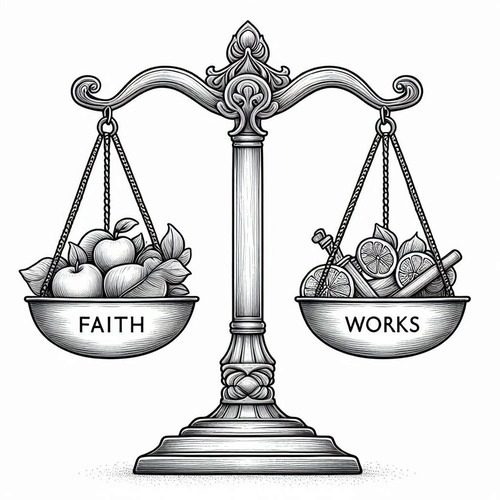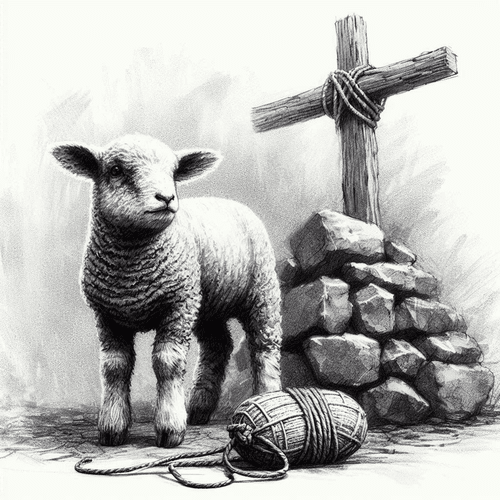Salvation: By Faith Or Works? Or Both?
Salvation: By faith or works? Or both? One of the most fundamental questions in Christian theology is this: What is required for salvation? Is it faith alone in Jesus Christ that saves, or do works (good deeds) also play a necessary role? This has been a source of considerable debate, even division among Christians. Let’s dive in, and see if we can find clarity in the Scriptures on this pivotal issue.
Faith Alone?
On one side, we have assertions such as Ephesians 2:8-9—”For it is by grace you have been saved, through faith—and this is not from yourselves, it is the gift of God—not by works, so that no one can boast.” This seems to clearly state salvation is by grace alone through faith alone, and not by works.
Additionally, in Romans 3:28 Paul writes, “For we maintain that a person is justified by faith apart from the works of the law.” And in Galatians 2:16 he says, “A person is not justified by the works of the law, but by faith in Jesus Christ.” Over and over, Paul appears to be dismissing works or obedience to the Law as requirements for justification before God.
Or is it Faith + Works?
Salvation: By faith or Works? Or both? Paul states in Romans 2:6-8: “God will repay each person according to what they have done. To those who by persistence in doing good seek glory, honour, and immortality, He will give eternal life. But for those who are self-seeking and who reject the truth and follow evil, there will be wrath and anger.” Here good works appear to be rewarded with eternal life.
Jesus Himself taught obedience to His words and doing the will of the Father is critical. “Not everyone who says to me, ‘Lord, Lord,’ will enter the kingdom of heaven, but only the one who does the will of my Father who is in heaven” (Matthew 7:21). And in John 14:15 He states plainly: “If you love me, keep my commands.”
Most perplexingly, James 2:24 declares: “You see that a person is justified by works and not by faith alone.” James provides the example of Abraham being “justified by works” when he offered up Isaac on the altar. This seems to directly contradict Paul’s statements about justification being by faith apart from works! READ MORE: CAN GOOD DEEDS HELP US GET TO HEAVEN?
Resolving the Tension
The key is found in understanding the different aspects of salvation being addressed. There is the legal declaration of justification—we’re made right before God by grace through faith in Christ’s work on the cross. No amount of human works could ever accomplish this judicial pardon for sin. Faith in Jesus is the only way to be justified, apart from deeds of the law.
However, justification is not the end of salvation, but the beginning. God’s desire is not only to declare His people righteous, but to make them righteous—to transfer them from the kingdom of darkness into the kingdom of light through spiritual rebirth and transformation by the Spirit. This sanctifying aspect of salvation is also a work of grace, accomplished through the Holy Spirit’s activity within believers.
James addresses the outward evidence of this inward transformation. True saving faith will always result in a changed life, but it’s crucial to understand that even our obedience and good works are the result of the Spirit’s work in us, not our own efforts.
Judgement and Rewards
While good works play no role in justification or sanctification as a means of earning God’s favor, they do relate to future rewards and blessings both in this age and the age to come (2 Corinthians 5:10). All who are justified by faith will inherit eternal life, but there are varying levels of reward in the eternal kingdom according to our faithfulness in allowing the Holy Spirit to work through us.
The Crucial Role of Obedience
Obedience remains important, not as a means of earning salvation or sanctification, but as a natural outworking of the Spirit’s presence in our lives. Jesus emphasized that even seemingly small acts of obedience hold great significance in His eyes:
“And if anyone gives even a cup of cold water to one of these little ones who is my disciple, truly I tell you, that person will certainly not lose their reward.” (Matthew 10:42)
While we are not saved by obedience, obedience is the lifestyle that naturally flows from one who is genuinely saved by grace through faith and is being sanctified by the Holy Spirit.
The Balanced View
Salvation: By faith or Works? Or both? Ultimately, we must be careful never to mistake the role of works—as crucial as they are, good works can never justify us before God or sanctify us. If works alone could make us righteous, Christ’s sacrifice would have been unnecessary. We are justified by grace alone through faith alone, lest any human being should boast (Ephesians 2:8-9).
Similarly, our sanctification is also a work of grace through the Holy Spirit. While obedience and good works are important in the Christian life, they are the fruit of the Spirit’s work in us, not the cause of our sanctification. As Paul reminds us in Galatians 3:3, “Are you so foolish? Having begun by the Spirit, are you now being perfected by the flesh?”
Salvation: By faith or Works? Or both? We must understand salvation is multi-faceted: both our justification and sanctification are by grace through faith. Good works are the evidence of the Spirit’s transforming work in our lives, not the means by which we earn or maintain our salvation. May we embrace this truth as we seek to walk faithfully with our Lord, relying on His grace and the power of the Holy Spirit for our growth in holiness.
Related Reads:
- Can Good Deeds Help Us Get to Heaven?
- The Cross: Answers to the Most-Searched Questions
- Defending Penal Substitutionary Atonement
Editor's Pick

Do Christians Need Holy Shrines? Why the Reformed Answer Is No
Walk into a medieval cathedral and you'll encounter ornate shrines, gilded reliquaries, and designated "holy places" where pilgrims gather to [...]

I Want To Believe, But Can’t: What Do I Do?
"I want to believe in God. I really do. But I just can't seem to make it happen. I've tried [...]

BC 1446 or 1250: When Did the Exodus Really Happen?
WHY REFORMED SCHOLARS SUPPORT THE EARLY DATE Many a critic makes the claim: “Archaeology has disproven the biblical account [...]

Does God Know the Future? All of It, Perfectly?
Think about this: our prayers tell on us. Every time we ask God for something, we’re confessing—often without realising it—what [...]

Can Christian Couples Choose Permanent Birth Control?
Consider Sarah, whose fourth pregnancy nearly killed her due to severe pre-eclampsia, leaving her hospitalised for months. Or David and [...]

Bone of My Bones: Why Eve Was Created From Adam’s Body
"This at last is bone of my bones and flesh of my flesh!" Adam's joyful exclamation upon first seeing Eve [...]

Is Calvinism Fatalism in Christian Disguise? Think Again
We hear the taunt every now and then: "Calvinism is just fatalism dressed up in Christian jargon." Critics argue Reformed [...]

Can Churches Conduct Same-Sex Weddings?
In an era of rapid cultural change, churches across America face mounting pressure to redefine their understanding of marriage. As [...]

Gender Reassignment: Can Christian Doctors Perform These Surgeries?
In the quiet of a clinic, a Christian physician faces a challenging ethical question. A patient sits across the desk, [...]

‘What Sorrow Awaits You Who Are Rich…’: What Does Jesus Mean?
The words hang in the air like a sword over comfortable Christianity: “What sorrow awaits you who are rich, for [...]
SUPPORT US:
Feel the Holy Spirit's gentle nudge to partner with us?
Donate Online:
Account Name: TRUTHS TO DIE FOR FOUNDATION
Account Number: 10243565459
Bank IFSC: IDFB0043391
Bank Name: IDFC FIRST BANK






